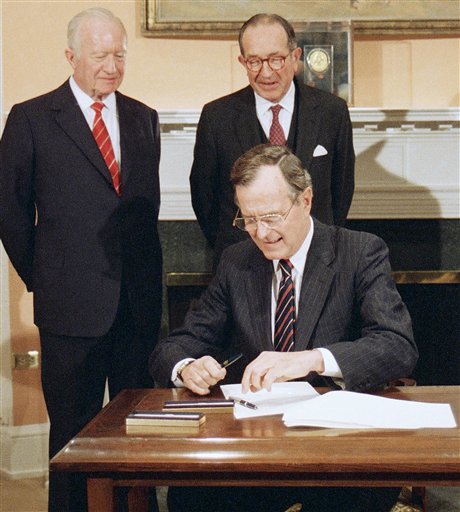The Supreme Court, in United States v. National Treasury Employees Union, 513 U.S. 454 (1995), ruled in favor of a government employees union that contended that a government act imposing on all government employees a prohibition on honoraria was a violation of First Amendment rights.
Treasury employees union contended honoraria ban restricted free speech
The 1989 Ethics Reform Act contained a provision amending the 1978 Ethics in Government Act to prohibit any member of Congress, executive branch officer, or other federal government employees from accepting honoraria for making a speech, making an appearance, or writing a speech, even if such activities had no connection to their official government duties.
The National Treasury Employees Union filed a suit in district court, claiming that the 1989 act violated the free speech rights of its members. The district court, affirmed by the appellate court, held for the union, asserting that the government did not show a nexus between the prohibited activities and its desire to eliminate actual or apparent improprieties by government employees.
Court invalidated honoraria ban as a First Amendment violation
Writing for the Court, Justice John Paul Stevens noted that the honoraria ban did curtail expressive behavior, but the government did not show how such a curtailment would further its interest in providing impartial government implementation of policy, especially for rank-and-file government employees.
As the act provided no support for establishing a nexus between the ban and the nature of specific government jobs, the Court held the entire honoraria prohibition unconstitutional. The majority emphasized that the government’s burden was far greater in this case because it involved a sweeping statute that impacted the free speech rights of countless employees, as opposed to an “isolated disciplinary action.”
Other justices said Court could have upheld honoraria ban for high-ranking officials
Justice Sandra Day O’Connor concurred with the judgment of the Court, finding the ban unconstitutional, but took issue with Stevens’s remedy, which would not allow the honoraria ban to be applied to any government official. She claimed that the Court had acknowledged that the law might be effectively imposed on high-ranking officials — for example, members of Congress; as such, the Court should allow the ban to be applied to upper-level officials.
Chief Justice William H. Rehnquist, in dissent, agreed with O’Connor that the remedy was too sweeping and that the Court could have easily made the ban inapplicable to lower-level government employees and left it at that. On a more fundamental level, Rehnquist contended that the Court gave little deference to the government’s concern as reflected in the honoraria ban.
The Court’s ruling in this case continued its often-confusing jurisprudence concerning government laws that, in the pursuit of creating an impartial or efficient workforce, would restrict employee rights.
This article was originally published in 2009. Dr. John M. Aughenbaugh is an assistant professor in the Political Science Department at Virginia Commonwealth University. His teaching and research interests focus generally on U.S. public law (Constitutional Law and Administrative Law), judicial politics, and public policy & administration.

